-
01-01-2018
Needs in Mental Health and Research
Revista Brasileira de Enfermagem. 2018;71:2077-2078
Abstract
Needs in Mental Health and Research
Revista Brasileira de Enfermagem. 2018;71:2077-2078
DOI 10.1590/0034-7167-2018-0363
Views0Psychic suffering is a public health problem in the world because it is strongly related to the loss of functionality, and to the presence of drastic reflexes in personal life and in the social context. Psychic suffering presents as determinants not only the abilities of individuals to deal with thoughts, emotions, behaviors, interactions, but also […]See more -
01-01-2018
Necessidades em saúde mental e pesquisa
Revista Brasileira de Enfermagem. 2018;71:2077-2078
Abstract
Necessidades em saúde mental e pesquisa
Revista Brasileira de Enfermagem. 2018;71:2077-2078
DOI 10.1590/0034-7167-2018-0363
Views0O sofrimento psíquico é um problema de saúde pública no mundo pois está fortemente relacionado à perda de funcionalidade, à apresentação de reflexos drásticos na vida pessoal e no contexto social. Dessa forma, apresenta como determinantes não somente as habilidades dos indivíduos para lidar com pensamentos, emoções, comportamentos, interações, mas também aspectos relacionados à vida […]See more -
REFLECTION01-01-2018
Ethical competences for the development of nursing care
Revista Brasileira de Enfermagem. 2018;71:1810-1814
Abstract
REFLECTIONEthical competences for the development of nursing care
Revista Brasileira de Enfermagem. 2018;71:1810-1814
DOI 10.1590/0034-7167-2017-0539
Views0See moreABSTRACT
Objective:
To present an analysis of the nursing ethos based on the disciplinary foundations of nursing to propose a definition of ethical competences for nursing training.
Method:
The present proposal is a theoretical reflection, based on a literature review of the specialty, both nursing and ethics.
Results:
we suggest basing the ethical education of nursing students integrating transversally disciplinary, bioethical and civic ethical competences, considering certain educational dimensions that favor their development.
Final considerations:
We expect that the definitions of three competences of the moral scope of nursing, contribute to cross-cutting proposals that promote the values and principles of the profession.
-
01-01-2018
Competencias éticas para el desarrollo del cuidado en enfermería
Revista Brasileira de Enfermagem. 2018;71:1810-1814
Abstract
Competencias éticas para el desarrollo del cuidado en enfermería
Revista Brasileira de Enfermagem. 2018;71:1810-1814
DOI 10.1590/0034-7167-2017-0539
Views0See moreRESUMEN
Objetivo:
Presentar un análisis del êthos de enfermería en base a los fundamentos disciplinares de ésta, a fin de proponer una definición de competencias éticas para la formación en enfermería
Método:
La presente propuesta es una reflexión teórica, fundamentada en una revisión de literatura de la especialidad, tanto de enfermería como de la ética.
Resultados:
se sugiere basar la formación ética de estudiantes de enfermería integrando transversalmente competencias éticas disciplinares, bioéticas y cívicas, considerando determinadas dimensiones educativas que favorecen su desarrollo.
Consideraciones finales:
Se espera que las definiciones de tres competencias del ámbito moral de la enfermería, contribuyan a propuestas transversales que logren fomentar los valores y principios de la profesión.
-
REFLECTION01-01-2018
The professor’s body: discourses on subjectivity to reflect on nurses’ education
Revista Brasileira de Enfermagem. 2018;71:1805-1809
Abstract
REFLECTIONThe professor’s body: discourses on subjectivity to reflect on nurses’ education
Revista Brasileira de Enfermagem. 2018;71:1805-1809
DOI 10.1590/0034-7167-2017-0456
Views0See moreABSTRACT
Objective:
to reflect on the body of the nursing professor in the subjectivity discourse.
Method:
this is a reflective essay on the theoretical and practical reverberations of the nursing professor’s body based on the Deleuzoguattarian discourse.
Results:
in the theoretical framework, the body of the nursing professor was considered as a producer of subjectivities and understood without organs, surrounded by strengths, desires, and affections. In the practical framework, we discussed pedagogical strategies developed by professors, such as dramatic games, simulated scenes, presentation of the line of care and living portfolio, characterized by stimulating nursing students to value political, civic, creative, and supportive dimensions.
Conclusion:
based on the subjectivity discourses, the professor’s body was demystified as uniquely holder of knowledge, and all participants in the educational scenario were considered active protagonists of collective knowledge.
-
EXPERIENCE REPORT01-01-2018
Nursing students in the community: entrepreneurial strategy and proponent of changes
Revista Brasileira de Enfermagem. 2018;71:1799-1804
Abstract
EXPERIENCE REPORTNursing students in the community: entrepreneurial strategy and proponent of changes
Revista Brasileira de Enfermagem. 2018;71:1799-1804
DOI 10.1590/0034-7167-2017-0382
Views1See moreABSTRACT
Objective:
To report the insertion of the nursing students of the Franciscan University Center in the community through the project Adopting a Family, contributing to critical thinking within the Nursing academic production and its articulation to collective health.
Results:
In the professors’ evaluation, the activity represented an effective articulation and insertion of the university in the community; for the students, it allowed for spaces of construction, deconstruction and negotiation with the unknown and the uncertain; for the families, it enabled the feeling of being remembered and valued as human beings and citizens. Through the experiences had, the transformation of health practices goes through the emergence and valuation of new knowledge.
Final considerations:
The insertion of the university in the community is constituted by an entrepreneurial strategy that is proponent of changes, due to its more effective and resolute outreach of health issues proposed by the national health system.

-
EXPERIENCE REPORT01-01-2018
From theory to practice, operating the clinical simulation in Nursing teaching
Revista Brasileira de Enfermagem. 2018;71:1791-1798
Abstract
EXPERIENCE REPORTFrom theory to practice, operating the clinical simulation in Nursing teaching
Revista Brasileira de Enfermagem. 2018;71:1791-1798
DOI 10.1590/0034-7167-2017-0180
Views0See moreABSTRACT
Objective:
To report the experience of the operationalization of clinical simulation as a pedagogical strategy in a subject of an undergraduate course in Nursing.
Method:
Clinical simulation cycles were carried out following the steps of action research, such as: planning, action, observation and reflection, from March 2014 to July 2015 with 10 professors and 44 students from a Primary Care and Mental Health subject of an undergraduate course in Nursing.
Results:
Five cycles of clinical simulation were performed, at the end of each cycle modifications were suggested by students and professors and the operation was adjusted to meet the needs of the subject. The main points of change were: professor role, logistics, equipment, debriefing model and preparation of “simulated patients”.
Final considerations:
The clinical simulation is a possible method to be operationalized in undergraduate course in Nursing, needs pedagogical and logistic planning as well as, sensitization of professors and students.

-
EXPERIENCE REPORT01-01-2018
Clinical simulation to teach nursing care for wounded patients
Revista Brasileira de Enfermagem. 2018;71:1785-1790
Abstract
EXPERIENCE REPORTClinical simulation to teach nursing care for wounded patients
Revista Brasileira de Enfermagem. 2018;71:1785-1790
DOI 10.1590/0034-7167-2017-0170
Views0See moreABSTRACT
Objective:
to report the experience of constructing and applicating clinical simulation scenarios for the evaluation and treatment of wounds.
Method:
experience report on two simulation scenarios for nursing care of wounded patients applied to nursing undergraduates. We structured simulations based on the model from the National League for Nursing/Jeffries Simulation Framework. The scenarios were evaluated by the instrument Simulation Design Scale and the students by the experience with the simulation.
Results:
the scenarios reproduced nursing care situations with the application of role play and moulage, which allowed us to evaluate and discuss the wound treatment. Reflections on the debriefing were important for the teaching-learning process and association between theory and practice, these factors determined the satisfaction of students with the activity.
Conclusion:
using clinical simulation scenarios to teach students favored the clinical reasoning and decision-making in the evaluation and treatment of wounds.
-
RESEARCH01-01-2018
Assistance flowchart for pain management in a Neonatal Intensive Care Unit
Revista Brasileira de Enfermagem. 2018;71:1281-1289
Abstract
RESEARCHAssistance flowchart for pain management in a Neonatal Intensive Care Unit
Revista Brasileira de Enfermagem. 2018;71:1281-1289
DOI 10.1590/0034-7167-2017-0265
Views0See moreABSTRACT
Objective:
To describe and discuss the process of developing a flowchart collectively constructed by the health team of a Neonatal Intensive Care Unit for the management of neonatal pain.
Method:
This is a descriptive and an exploratory study with a qualitative approach that used Problem-Based Learning as a theoretical-methodological framework in the process of developing the assistance flowchart for the management of neonatal pain.
Results:
Based on this methodology, there was training in service and the discussion of key points of pain management by the health team, which served as input for the construction of the flowchart.
Final considerations:
The assistance flowchart for pain management, based on scientific evidence, provided means to facilitate the decision-making of the health team regarding the pain of the newborn. It is suggested to use the flowchart frequently to promote the permanent education of the team and identify possible points to be adjusted.

-
RESEARCH01-01-2018
The adolescent and the institutionalization: understanding the phenomenon and meanings attributed to it
Revista Brasileira de Enfermagem. 2018;71:1373-1380
Abstract
RESEARCHThe adolescent and the institutionalization: understanding the phenomenon and meanings attributed to it
Revista Brasileira de Enfermagem. 2018;71:1373-1380
DOI 10.1590/0034-7167-2017-0242
Views1See moreABSTRACT
Objective:
To understand the meaning of being institutionalized and in conflict with the law for the institutionalized adolescent.
Method:
A qualitative, phenomenological-comprehensive study carried out in a Socio-educational Service Foundation in the northern region of Brazil, with 05 institutionalized adolescents. The analysis was carried out under the understanding of the content suggested by Heidgger, thus allowing the construction of analytical categories for a hermeneutical interpretation.
Results:
Conflicting with the law means something negative and bad for the institutionalized adolescents, in which they understand that although there is deprivation of liberty, the period of hospitalization is an important moment for the reflection on the need to start over.
Conclusion:
The meaning of conflicting with the law goes far beyond a simple word, act or behaviour, it is something that only those who experience the phenomenon are able to unveil, arouse deep feelings and provide reflection to the adolescent about the damages caused by the infraction.
-
RESEARCH01-01-2018
Identification of post-cesarean surgical site infection: nursing consultation
Revista Brasileira de Enfermagem. 2018;71:1395-1403
Abstract
RESEARCHIdentification of post-cesarean surgical site infection: nursing consultation
Revista Brasileira de Enfermagem. 2018;71:1395-1403
DOI 10.1590/0034-7167-2017-0325
Views0See moreABSTRACT
Objective:
To describe the profile of women in relation to their living conditions, health status and socio-demographic profile, correlating it with the presence of signs and symptoms suggestive of post-cesarean surgical site infection, identifying information to be considered in the puerperium consultation performed by nurses and proposing a roadmap for the systematization of care.
Method:
Quantitative, exploratory, descriptive, cross-sectional and retrospective review of medical records of women who had cesarean deliveries in 2014, in the city of São Paulo.
Results:
89 medical records were analyzed, 62 of them with incomplete information. In 11, there was at least one of the signs and symptoms suggestive of infection.
Conclusion:
Given the results of the study, the systematization of puerperal consultation is essential. The roadmap is an instrument that can potentially improve the quality of service and the recording of information.
-
RESEARCH01-01-2018
Nursing laboratory and critical education of nurses: approaches and distances
Revista Brasileira de Enfermagem. 2018;71:1500-1506
Abstract
RESEARCHNursing laboratory and critical education of nurses: approaches and distances
Revista Brasileira de Enfermagem. 2018;71:1500-1506
DOI 10.1590/0034-7167-2017-0339
Views1See moreABSTRACT
Objective:
to analyze the contribution of the laboratory of nursing to the critical education of nurses.
Method:
qualitative study, conducted among 18 professors of higher education institutions, being one public and the other private. Data were collected between February and November of 2016 by means of semi-structured interview. To analyze data, it was used a content analysis in the thematic modality.
Results:
it was observed the emphasis in the technical skills development by propagation of behavior and practices; the creation of bonds between professors and students happens on the limit of good interpersonal relationship; the laboratory of nursing may help the critical reflection about the practice, being a place that allows the learning of ethics.
Final considerations:
the nurse education, carried out by the laboratory of nursing, have to overcome the emphasis in the uncritical reproduction of practices and to observe the nurse’s power to think about the reality in the meaning of its modification.
-
RESEARCH01-01-2018
Introduction of the School Health Program in the city of Cascavel, Paraná State: report of nurses
Revista Brasileira de Enfermagem. 2018;71:1540-1547
Abstract
RESEARCHIntroduction of the School Health Program in the city of Cascavel, Paraná State: report of nurses
Revista Brasileira de Enfermagem. 2018;71:1540-1547
DOI 10.1590/0034-7167-2017-0188
Views1See moreABSTRACT
Objective:
to understand the introduction of the School Health Program in the city of Cascavel, Paraná State, as opposed to the report of nurses.
Method:
a qualitative study with fifteen participants. The data were collected from April to August 2015, through semi-structured interviews, analyzed by content analysis and thematic modality.
Results:
the category “Introduction process” of the School Health Program integrates the subcategories “Identified health problems” and the “Challenges of intersectoriality”. The program was implemented quickly, with a fragile training of professionals to perform in the phases that compose it. Structural conditions of schools, human and material resources, and emerging intersectoral interaction were identified obstacles. The integration of the health, school, and family constitutes the program’s potentiality.
Final considerations:
it is understood that the actions of the program were based on health assessments of students, and it is necessary for professionals and managers to discuss and analyze the obstacles identified to achieve all the proposed objectives.
-
RESEARCH01-01-2018
Knowledge about precautions in Primary Health Care: tool validation
Revista Brasileira de Enfermagem. 2018;71:1589-1595
Abstract
RESEARCHKnowledge about precautions in Primary Health Care: tool validation
Revista Brasileira de Enfermagem. 2018;71:1589-1595
DOI 10.1590/0034-7167-2017-0886
Views0See moreABSTRACT
Objective:
To elaborate and validate a tool to assess knowledge and behavior of nursing professionals about standards and specific precautions in the Primary Health Care.
Method:
Methodological study of the elaboration and validation of the tool by thirteen experts judges, using a Likert scale of 4 points, with Content Validity Index ≥ 0.80, on clarity, relevance and pertinence.
Results:
A tool composed of 47 dichotomous questions to assess knowledge and 12 questions, with five options of answers, for the referred behavior. In the validation, only one item was deleted, related to the “Hands Hygiene” axis and one item was reformulated, regarding “Use of Common Gloves” and another 11 changed writing. The tool as a whole was assessed for relevance, comprehensiveness and representativeness within the scope of the topic investigated.
Conclusion:
The developed tool has been validated and is now available for use in Primary Health Care.
-
RESEARCH01-01-2018
Training in diabetes education: meanings attributed by primary care nurses
Revista Brasileira de Enfermagem. 2018;71:1611-1618
Abstract
RESEARCHTraining in diabetes education: meanings attributed by primary care nurses
Revista Brasileira de Enfermagem. 2018;71:1611-1618
DOI 10.1590/0034-7167-2017-0792
Views1See moreABSTRACT
Objective:
seize meanings attributed by primary care nurses to training in diabetes education.
Method:
exploratory and descriptive study, with a qualitative approach, with twenty primary care nurses; semistructured interview script, with interviews processed in the IRaMuTeQ software and analyzed through the Descending Hierarchical Classification. The results were subsidized in the Representational Theory of Meaning.
Results:
nurse training in diabetes education is insufficient for holistic action, although it allows the community to be instrumentalized in specific issues about the disease, using the limited tools available, especially lectures. Nurses find themselves in a context of challenges, improvisations, weaknesses, and limitations that determine the meaning attributed to diabetes education and subsequent actions.
Conclusion:
the meanings attributed by the nurses revealed an incipient training, which limits the quality of care provided and instigates the search for qualification.

-
RESEARCH01-01-2018
Nursing international student mobility in the University of São Paulo
Revista Brasileira de Enfermagem. 2018;71:1619-1625
Abstract
RESEARCHNursing international student mobility in the University of São Paulo
Revista Brasileira de Enfermagem. 2018;71:1619-1625
DOI 10.1590/0034-7167-2017-0754
Views1See moreABSTRACT
Objective:
To characterize the experiences of undergraduate students of the School of Nursing of the University of São Paulo (EEUSP) who participated in international mobility programs between January 2011 and July 2017.
Method:
Exploratory, descriptive study with quantitative approach. Of 68 reports, only 38 (56%) were considered valid and were submitted to descriptive statistical analysis. Data were categorized in general, institutional, academic and cultural aspects and cost of living.
Results:
The main destination was Portugal and the years with most participation were 2012 and 2013. The mean stay was six months and the students took a mean of three to four courses. The main funder was the university of origin.
Conclusion:
Academic activities were limited to theoretical and practical courses, with little insertion in research. There is a need to increase investment in learning other languages and to expand partnerships with larger centers of foreign education and research.
-
REVIEW07-29-2020
Frailty syndrome in the elderly: conceptual analysis according to Walker and Avant
Revista Brasileira de Enfermagem. 2020;73:e20190601
Abstract
REVIEWFrailty syndrome in the elderly: conceptual analysis according to Walker and Avant
Revista Brasileira de Enfermagem. 2020;73:e20190601
DOI 10.1590/0034-7167-2019-0601
Views0See moreABSTRACT
Objective:
To analyze the concept of “frailty syndrome” in the literature, according to the method proposed by Walker and Avant.
Methods:
It is a concept analysis, guided by the method proposed by Walker and Avant, made operational through an integrative literature review. The search in a scientific database was carried out using the descriptors: Frail elderly, syndrome, phenotype, geriatric assessment, and aging. The literary corpus comprised 66 studies. Results: The study found the antecedents and attributes (categorized as physical, sociodemographic, and behavioral/environmental) that integrate the signs and symptoms evidenced in the “frailty syndrome,” as well as the consequences of this concept. The variables were analyzed with emphasis on the conceptions that influence the frailty process of the elderly.
Conclusion:
The study demonstrated the complexity arising from the multifactorial genesis of the referred syndrome, emphasizing the specificities of the elderly’s frailty. However, we recommend conducting further research involving the phenomenon in question to understand the construct better.
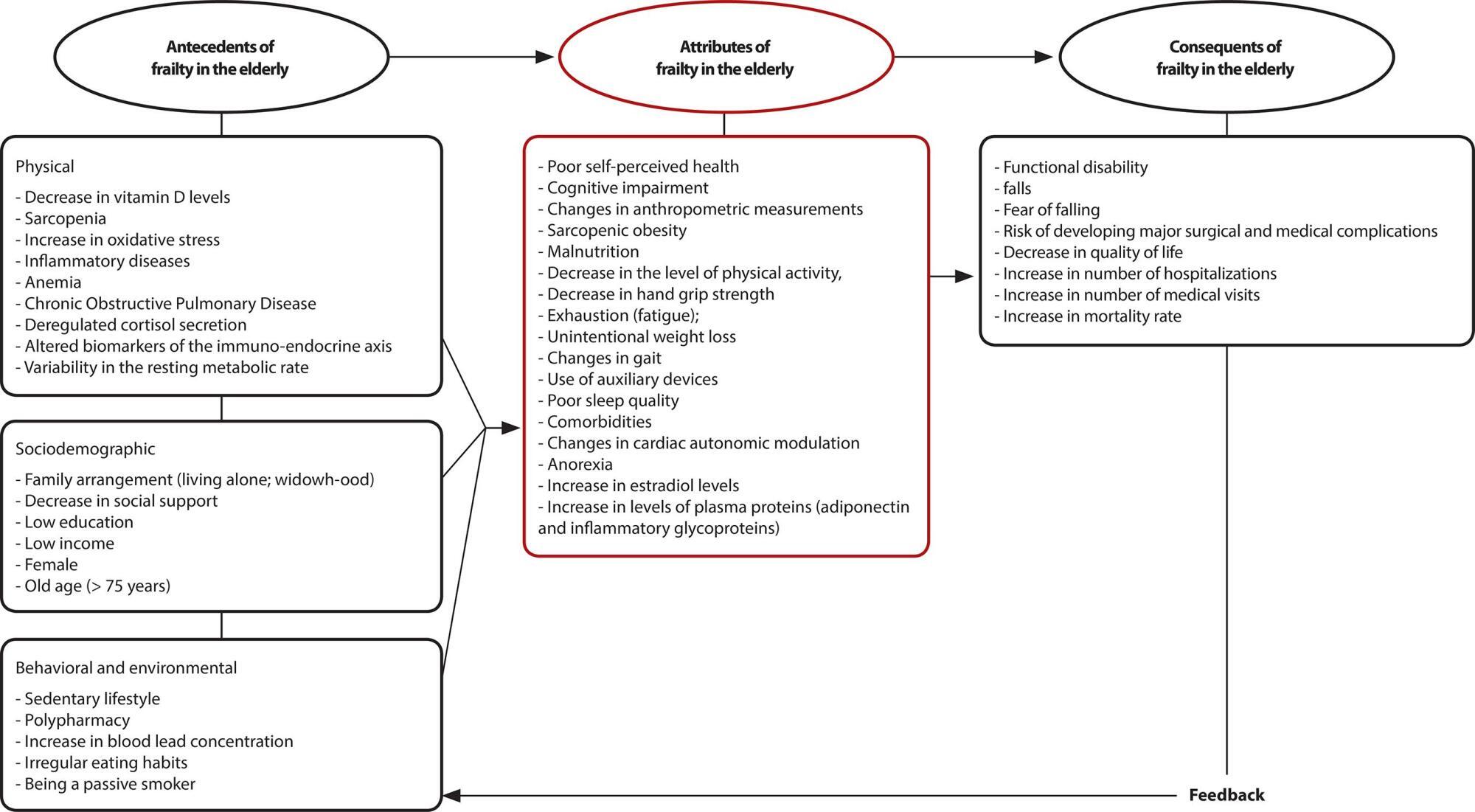
-
ORIGINAL ARTICLE09-16-2019
Tuberculosis: health care and surveillance in prisons
Revista Brasileira de Enfermagem. 2019;72(5):1304-1310
Abstract
ORIGINAL ARTICLETuberculosis: health care and surveillance in prisons
Revista Brasileira de Enfermagem. 2019;72(5):1304-1310
DOI 10.1590/0034-7167-2018-0260
Views0See moreABSTRACT
Objective:
To identify tuberculosis-related health care and surveillance actions in Prison Health Units.
Method:
Cross-sectional study, of quantitative, exploratory and descriptive character. We visited 13 Teams of Prison Health, and nurses and technicians were interviewed regarding epidemiological surveillance instruments, physical structure and materials.
Results:
Search for respiratory symptoms in admission was reported by 6 (46.2%) of the teams, and the smear microscopy was the most requested test. The Logbook of Respiratory Symptoms and the Logbook for Monitoring Tuberculosis Cases were used in 7 (53.8%) institutions. Two of them (15.4%) had a location for sputum collection and 1 (7.7%) had a radiographer. The Directly Observed Therapy was reported in 7 (53.8%) units.
Conclusion:
Health care actions related to the search for respiratory symptoms and Directly Observed Therapy should be expanded, as well as surveillance actions and recording in official documents of the National Tuberculosis Control Program.
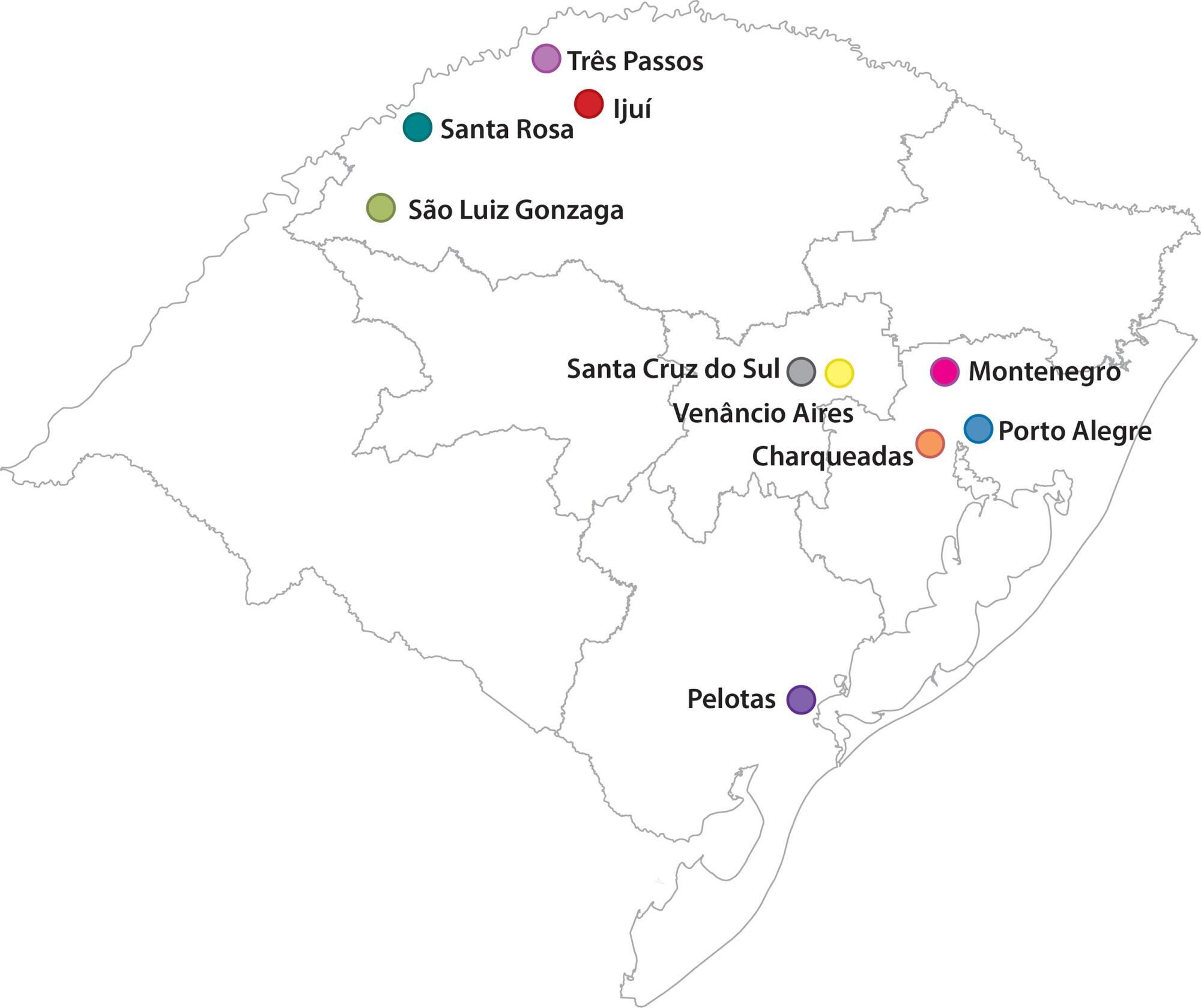
-
04-14-2021
COVID-19 patients in prone position: validation of instructional materials for pressure injury prevention
Revista Brasileira de Enfermagem. 2021;74:e20201185
Abstract
COVID-19 patients in prone position: validation of instructional materials for pressure injury prevention
Revista Brasileira de Enfermagem. 2021;74:e20201185
DOI 10.1590/0034-7167-2020-1185
Views0See moreABSTRACT
Objective:
to perform the content and face validation of a checklist and a banner on pressure injury prevention in patients in prone position.
Method:
this is a methodological study of content and face validation with 26 nurses with specialization. Professionals assessed the checklist and the banner in relation to clarity, theoretical relevance, practical relevance, relation of the figures to the text and font size. The Content Validity Index was calculated for each item, considering one with a value equal to or greater than 0.8 as valid.
Results:
all the actions described in the checklist and in the banner had a Content Validity Index greater than 0.80, with standardization of verbal time and esthetic adjustments in the banner’s layout, as suggested.
Conclusions:
the checklist and the banner were validated and can be used in clinical practice to facilitate pressure injury preventions in patients in prone position.
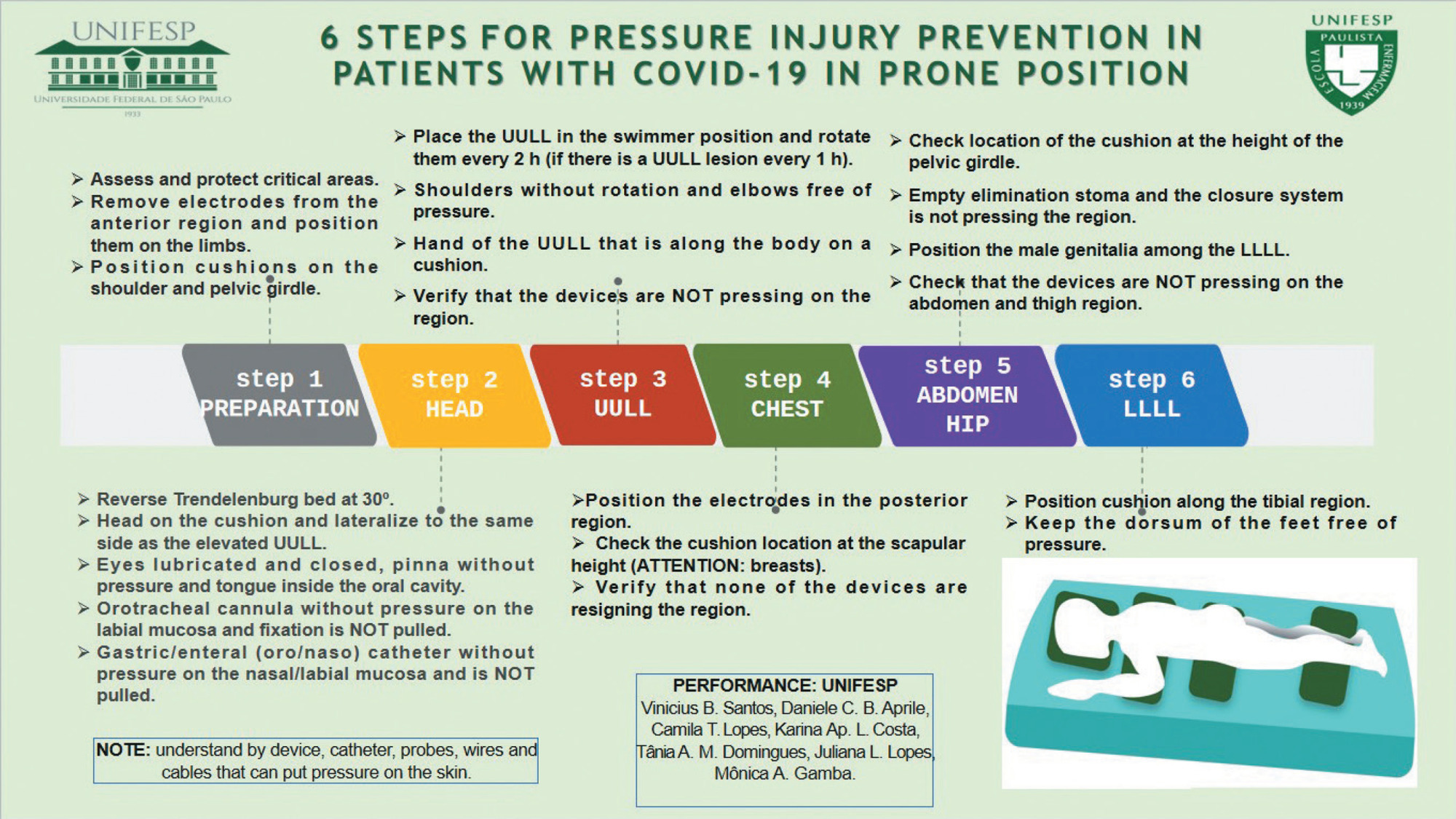
-
02-10-2020
Development of middle-range theories in nursing
Revista Brasileira de Enfermagem. 2020;73(1):e20170893
Abstract
Development of middle-range theories in nursing
Revista Brasileira de Enfermagem. 2020;73(1):e20170893
DOI 10.1590/0034-7167-2017-0893
Views0See moreABSTRACT
Objective:
To identify in the literature how Middle-Range Theories (MRT) are being developed in Nursing.
Method:
Integrative review on the databases Lilacs (Latin American and Caribbean Literature in Health Sciences), Scopus, Cinahl (Cumulative Index to Nursing and Allied Health Literature), Web of Science and PubMed portal, using the keywords middle range theory and nursing, as well its Portuguese correspondents (Lilacs), and the Boolean operator AND. The sample included 25 articles.
Results:
All articles presented concepts related to MRT. Most developed a synthesis picture. Some theories have formulated specific propositions, hypotheses, and names. Only 16 articles cited the methodological framework, while 22 used theories or models for theoretical foundation and 11 carried out literature reviews.
Final considerations:
The development of MRT included the presentation of fundamental concepts, synthesis, propositions, hypotheses and specific name. The MRT is recognized as a way of developing knowledge to guide the nursing practice.
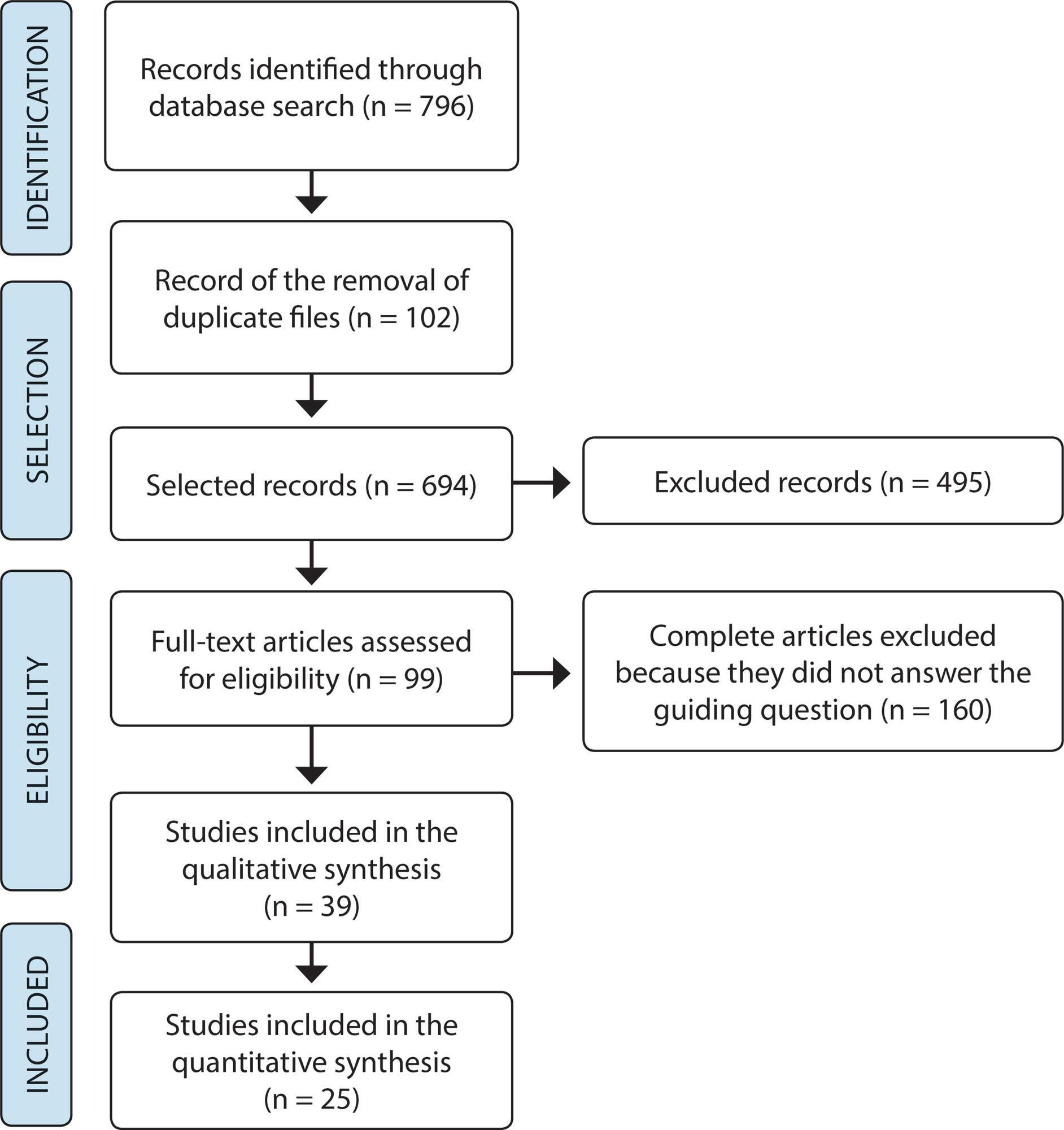
-
09-16-2019
Construct validation: coping with HIV/AIDS in Primary Health Care
Revista Brasileira de Enfermagem. 2019;72(5):1173-1181
Abstract
Construct validation: coping with HIV/AIDS in Primary Health Care
Revista Brasileira de Enfermagem. 2019;72(5):1173-1181
DOI 10.1590/0034-7167-2018-0734
Views0See moreABSTRACT
Objective:
To validate the construct and measure the trustworthiness of a questionnaire aimed at assessing HIV/AIDS coping actions developed by health professionals in Primary Health Care.
Method:
A methodological study carried out with 397 primary health care professionals in two municipalities in the Northeast region of Brazil. The construct validity was developed by the exploratory and confirmatory factor analysis, and the reliability analyzed by the reliability and reproducibility.
Results:
The validation determined six factors retention that composed the six domains of the questionnaire. Internal consistency was 0.91 and quality of the confirmatory analysis adjustment was 0.998 for Goodness of Fit Index. The domains presented Kappa values between 0.833 and 0.997.
Conclusions:
The final questionnaire was composed of 18 items and presented feasibility of application, and potential to evaluate actions for HIV/AIDS control in Primary Health Care.
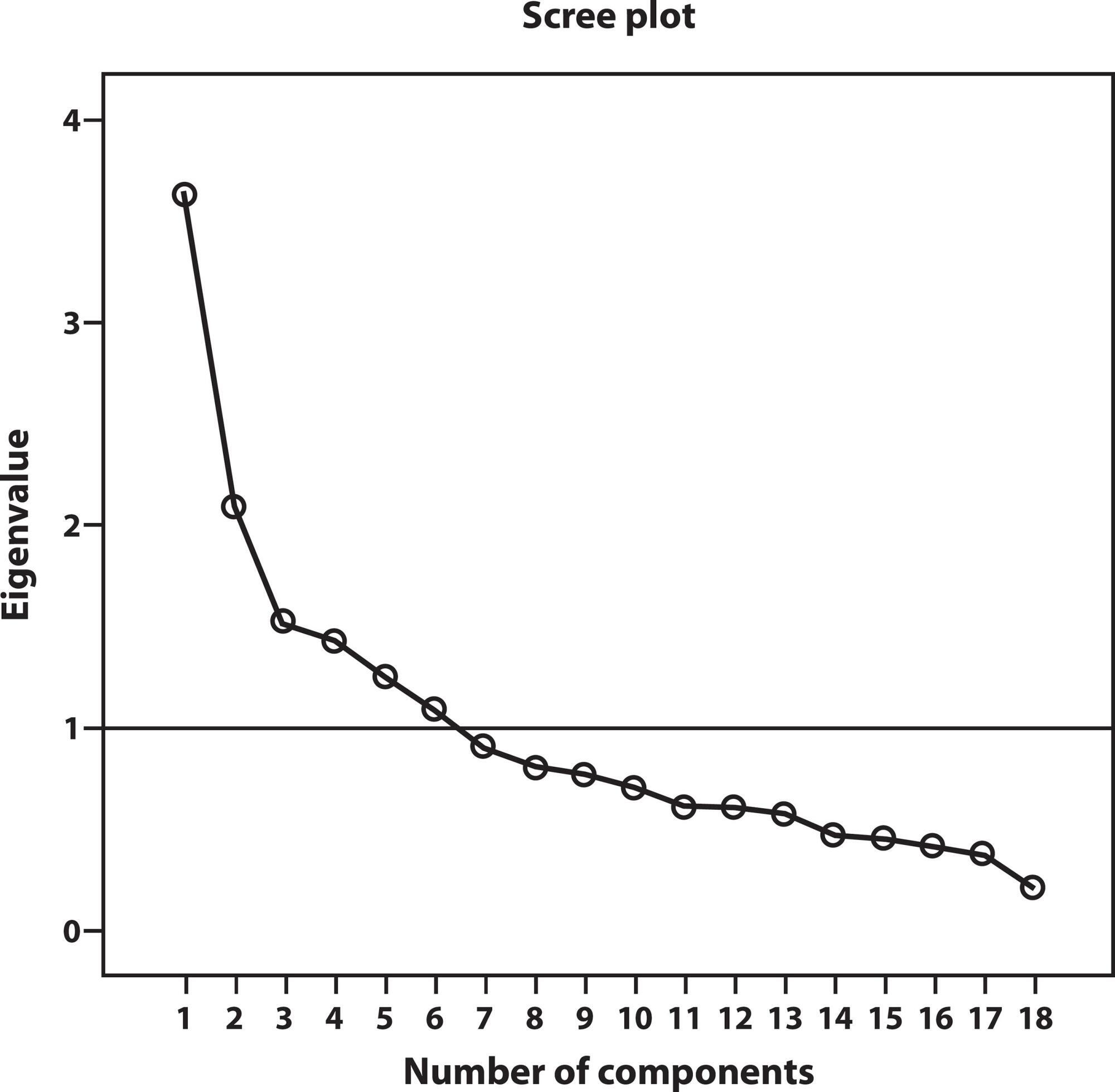
-
ORIGINAL ARTICLE02-10-2020
Stress and health risk behaviors among university students
Revista Brasileira de Enfermagem. 2020;73(1):e20180035
Abstract
ORIGINAL ARTICLEStress and health risk behaviors among university students
Revista Brasileira de Enfermagem. 2020;73(1):e20180035
DOI 10.1590/0034-7167-2018-0035
Views0See moreABSTRACT
Objective:
To analyze the level of stress and its relationship with health risk behaviors among university students.
Method:
Cross-sectional analytical study carried out at a higher education institution in Picos-PI. A total of 377 students were evaluated for socio-demographic and academic variables, stress profile, sleep quality, alcohol use, smoking habits and level of physical activity. The Statistical Package for the Social Sciences (SPSS), version 20.0 was used for data processing and analysis.
Results:
Sleep quality was poor for 65.3% of the subjects, and sleep disturbances were found in 17.0%. Stress was observed in 68.7% of the sample. Stress was associated with the following variables: gender, time in the institution, poor sleep quality.
Conclusion:
Most of the students evaluated present some level of stress associated with poor sleep quality, which is a risk to the quality of life of these individuals.
-
ORIGINAL ARTICLE03-24-2021
Self-care of people with intestinal ostomy: beyond the procedural towards rehabilitation
Revista Brasileira de Enfermagem. 2021;74(1):e20200088
Abstract
ORIGINAL ARTICLESelf-care of people with intestinal ostomy: beyond the procedural towards rehabilitation
Revista Brasileira de Enfermagem. 2021;74(1):e20200088
DOI 10.1590/0034-7167-2020-0088
Views0See moreABSTRACT
Objectives:
to interpret the self-care experience of people with intestinal ostomy registered in an ostomy program, based on the framework of the Social Model of Disability.
Methods:
qualitative exploratory research, with the participation of nine people with intestinal ostomy, based on the Social Model of Disability.
Results:
majority were elderly, married, male with colostomy due to colorectal neoplasia. The self-care of these people was analyzed in two thematic groups: “Interdisciplinary assistance needed for people with intestinal ostomy” and “Self-care for the rehabilitation of the person with intestinal ostomy”. It was proved that there was a need for a specialized health team, offering information on disabilities, teaching self-care and perioperative follow-up.
Final Considerations:
when the social barriers of physical disabilities are overcome in the context of assistance for health and life, self-care will go beyond the reductionist vision of procedural care, towards comprehensive care, favoring the achievement of rehabilitation and the quality of survival.
-
03-19-2021
Production and validation of educational technology on nursing care for syphilis prevention
Revista Brasileira de Enfermagem. 2021;74:e20190694
Abstract
Production and validation of educational technology on nursing care for syphilis prevention
Revista Brasileira de Enfermagem. 2021;74:e20190694
DOI 10.1590/0034-7167-2019-0694
Views0See moreABSTRACT
Objectives:
Validate script and storyboard of a video for educational intervention on nursing care for the prevention and management of syphilis.
Methods:
Methodological design study, with quantitative analysis approach. The content and appearance of the educational video script and storyboard was validated by a committee of experts on the subject and video. They were considered validated from the agreement of 78%, calculated by means of the Content Validity Index.
Results:
There were suggestions, which were analyzed; and, where relevant, the script and storyboard were changed. The degree of agreement among the expert judges on the subject obtained a Content Validity Index (CVI) of 100%, while, with the technical experts in video, all the questions in the educational material obtained the percentage above the recommended minimum of 78%.
Conclusion:
The validated video is an important technological production and could be used in the context of health care.
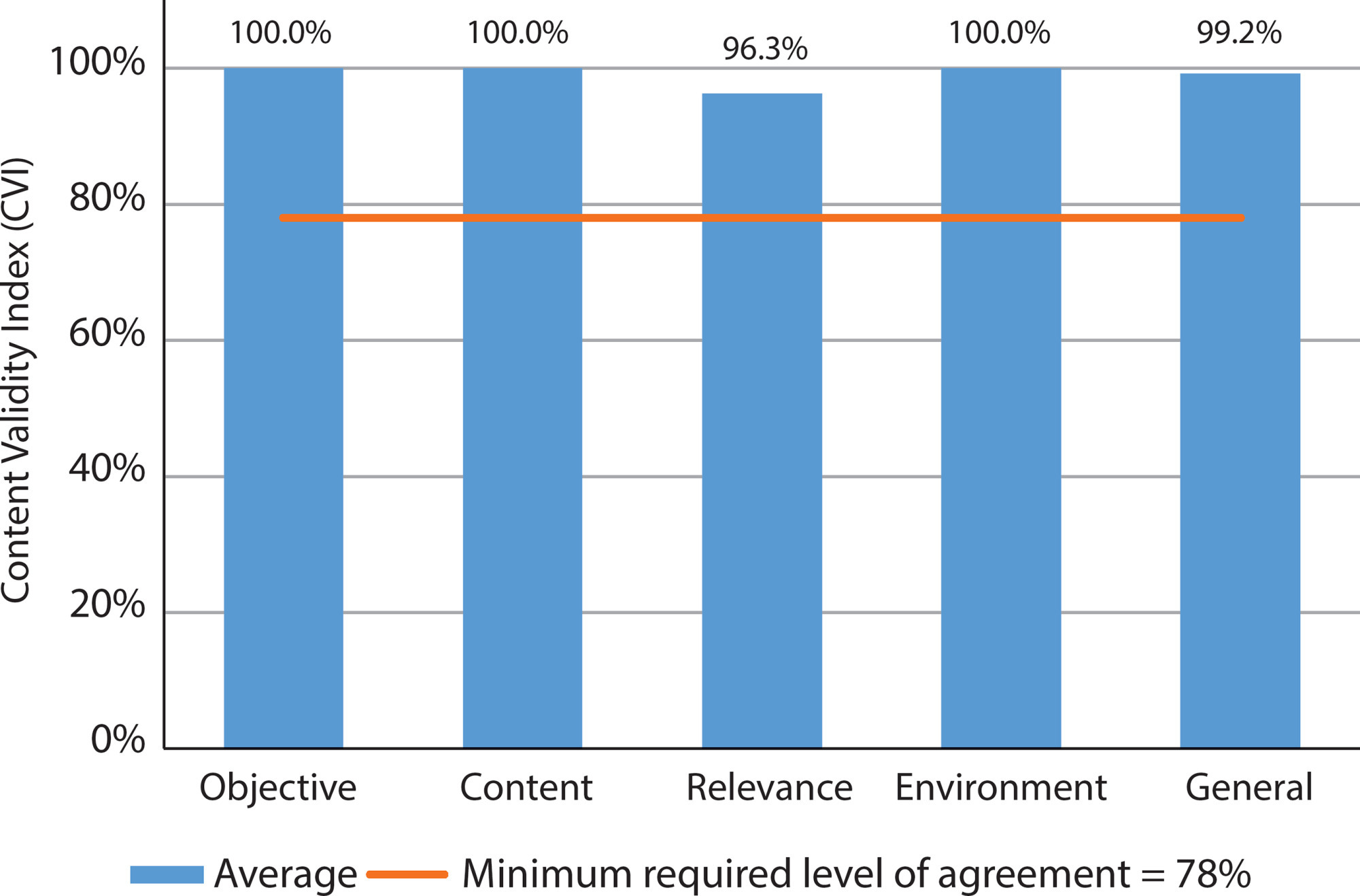
Search
Search in:
Nuvem de Tags
Adolescente (85) Atenção Primária à Saúde (239) COVID-19 (91) Criança (91) Cuidados de Enfermagem (269) Educação em Enfermagem (151) Educação em Saúde (139) Enfermagem (930) Enfermagem Pediátrica (86) Estudantes de Enfermagem (77) Estudos de Validação (131) Família (87) Idoso (208) Promoção da Saúde (99) Qualidade de Vida (104) Saúde do Trabalhador (86) Saúde Mental (145) Saúde Pública (82) Segurança do Paciente (150) Tecnologia Educacional (100)



